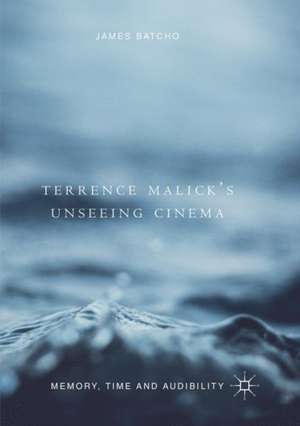Terrence Malick’s Unseeing Cinema: Memory, Time and Audibility
Autor James Batchoen Limba Engleză Paperback – 24 ian 2019
| Toate formatele și edițiile | Preț | Express |
|---|---|---|
| Paperback (1) | 775.96 lei 6-8 săpt. | |
| Springer International Publishing – 24 ian 2019 | 775.96 lei 6-8 săpt. | |
| Hardback (1) | 781.00 lei 6-8 săpt. | |
| Springer International Publishing – 4 iun 2018 | 781.00 lei 6-8 săpt. |
Preț: 775.96 lei
Preț vechi: 946.29 lei
-18% Nou
Puncte Express: 1164
Preț estimativ în valută:
148.53€ • 161.39$ • 124.84£
148.53€ • 161.39$ • 124.84£
Carte tipărită la comandă
Livrare economică 21 aprilie-05 mai
Preluare comenzi: 021 569.72.76
Specificații
ISBN-13: 9783030094850
ISBN-10: 3030094855
Pagini: 201
Ilustrații: XV, 201 p.
Dimensiuni: 148 x 210 mm
Greutate: 0.27 kg
Ediția:Softcover reprint of the original 1st ed. 2018
Editura: Springer International Publishing
Colecția Palgrave Macmillan
Locul publicării:Cham, Switzerland
ISBN-10: 3030094855
Pagini: 201
Ilustrații: XV, 201 p.
Dimensiuni: 148 x 210 mm
Greutate: 0.27 kg
Ediția:Softcover reprint of the original 1st ed. 2018
Editura: Springer International Publishing
Colecția Palgrave Macmillan
Locul publicării:Cham, Switzerland
Cuprins
1. Introduction.- 2. Unseeing.- 3. 'Logos' of Cinema.- 4. Days of Heaven and Hell.- 5. Malick's Temporal Shift.- 6. Listening to the 'Logos'.- 7. Continuer.
Notă biografică
James Batcho is Assistant Professor at United International College, China. He is the author of Sound for Independent Audiovisual Storytelling.
Textul de pe ultima copertă
This unique study opens up a new dimension of Terrence Malick’s cinema – its expressions of unseeing and hearing. ‘Unseeing’ is Malick’s means of transcending the moment in order to enter the life that unfolds; to treat cinema as a real experience for those who live its reality. In this way, Terrence Malick’s Unseeing Cinema moves beyond film theory to advance a work of original philosophy, bringing together two thinkers not normally associated with one another: Gilles Deleuze and Søren Kierkegaard. It investigates how Malick’s gatherings of time allow one to explore new philosophical questions about immanence and transcendence, ethics and faith, time and infinity, and the foldings of subjectivity that are central to both philosophers. Beyond cinema, it offers a way to think about our everyday repetitions and recollections and our ephemeral points of connection with those we love.
Caracteristici
Offers a radical reorientation to how we think about films and filmmaking Challenges film theory’s familiar language, representational and visual approaches, to advance the work of Deleuze, particularly the ‘unseeing’ aspects of his philosophy of difference Subverts dominant discourses of sound phenomenology to emphasize experiences of hearing and listening
